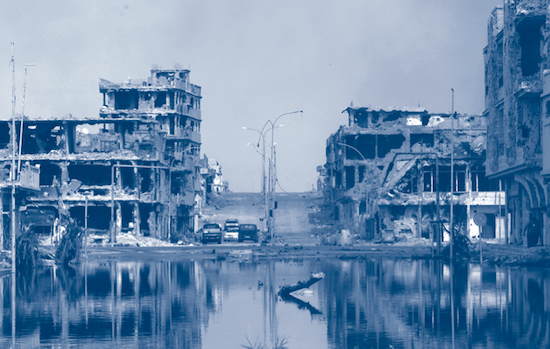The wave of popular unrest that started with Tunisia earlier this year – quickly dubbed Arab Spring in the media – is now in late autumn, which should be the right time to recap what sorts of changes the events in the region have produced.
The desire to overthrow dictators was certainly not the primary reason. Perhaps it would be more accurate to say the dictators were symbols of the problems actually behind the dissatisfaction: overpopulation, unemployment and the resulting poverty, corruption, lack of social cohesiveness, religious, ethnic and tribal conflicts, a gaping rift between the haves and the have-nots, lack of clean water and – surprise, surprise – a pitched hostility to the West. For it is Western countries that are singled out by a critical mass as the main culprit for the fact that they are so poorly off compared to the developed world. They do not blame themselves or their own capacity for governance for this.
A view of a street in the devastated area where former Libyan leader Muammar Gaddafi was hiding out in Sirte October 22, 2011. Gaddafi, on the run for more than two months, was tracked down and killed in his hometown Sirte by opposition fighters on Thursday. Foto: Scanpix
For many Arabs, the conciliatory Western-oriented course followed by their now-overthrown leaders smacked of the previous, pre- and post-WWII period when the local rulers were little more than lackeys for the West, who as such lost their legitimacy in the people’s eyes and were finally eliminated from power through coups. Now the architects of those coups or their successors face the same fate.
Hence, whatever name we give the unrest in the Middle East and North Africa, these were not democratic revolutions that would replace dictatorships with liberal parliamentary systems. The West’s support for the popular unrest might have contributed to Hosni Mubarak’s overthrow and the killing of Moamar Gaddafi but it also unarguably increased anti-Western animosity in the region and throughout the Islamic world.
Now we are seeing how a relatively motley crew has filled the power vacuum. Second-echelon pen-pushers of the former governments are setting the tone along with military personnel and politicians who switched sides at the right time. It is highly naïve to presume that this lot will resolutely start carrying out Western and democratic reforms in their countries.
From this point of view, the intervention of NATO and the West in the Libyan civil war was undoubtedly a profound strategic mistake. In spite of a tactical victory with a short term effect, this will strongly contribute to religious fundamentalism in the region and reinforce the idea of restoring the caliphate even more strongly among the people in the region. The prospect of having an aggressive and religiously fanatic Middle East in its neighbourhood is anything but pleasant for Europe, especially considering the latter’s numerous existing Muslim minorities, migration pressure and Europe’s own demographic decline.
The situation is all the more worrisome considering that theocratic Iran is rising in authority as a leader of the Islamic world. What is paradoxical is that both the outcome of the Arab Spring and the West’s diplomatic and military interventions of the last few decades work most clearly in the favour of Iran.
Unlike Libya, which lacks geopolitical strategic importance – making the overthrow and killing of Gaddafi more of a media event than a change in political paradigm – Iran, Iraq and Syria are countries that have critical strategic importance. If we add here that Iran with its close to 80 million inhabitants is at least a regional superpower and that in the coming years, Teheran will likely join the nuclear club, we have a good deal to think about when it comes to Arab Spring and the developments in the Middle East as a whole in the last decades.
Of course we can console ourselves with the fact that another local superpower – Egypt with nearly 80 million people of its own– has a strong enough self-identity as not to fall directly under the influence of Teheran. But the Islamicization or “greening” of Egypt is still a prospect that outweighs hopes of the country getting on a path to European democratization. And the third, Near Eastern superpower Turkey twists and turns desperately between Europe and Islam, and thus even as a member of NATO does not constitute a trustworthy ally for the West against the green wave rising from the deserts of the Levant and Maghreb.
Hence, whatever name we give the unrest in the Middle East and North Africa, these were not democratic revolutions that would replace dictatorships with liberal parliamentary systems. The West’s support for the popular unrest might have contributed to Hosni Mubarak’s overthrow and the killing of Moamar Gaddafi but it also unarguably increased anti-Western animosity in the region and throughout the Islamic world.
Now we are seeing how a relatively motley crew has filled the power vacuum. Second-echelon pen-pushers of the former governments are setting the tone along with military personnel and politicians who switched sides at the right time. It is highly naïve to presume that this lot will resolutely start carrying out Western and democratic reforms in their countries.
From this point of view, the intervention of NATO and the West in the Libyan civil war was undoubtedly a profound strategic mistake. In spite of a tactical victory with a short term effect, this will strongly contribute to religious fundamentalism in the region and reinforce the idea of restoring the caliphate even more strongly among the people in the region. The prospect of having an aggressive and religiously fanatic Middle East in its neighbourhood is anything but pleasant for Europe, especially considering the latter’s numerous existing Muslim minorities, migration pressure and Europe’s own demographic decline.
The situation is all the more worrisome considering that theocratic Iran is rising in authority as a leader of the Islamic world. What is paradoxical is that both the outcome of the Arab Spring and the West’s diplomatic and military interventions of the last few decades work most clearly in the favour of Iran.
Unlike Libya, which lacks geopolitical strategic importance – making the overthrow and killing of Gaddafi more of a media event than a change in political paradigm – Iran, Iraq and Syria are countries that have critical strategic importance. If we add here that Iran with its close to 80 million inhabitants is at least a regional superpower and that in the coming years, Teheran will likely join the nuclear club, we have a good deal to think about when it comes to Arab Spring and the developments in the Middle East as a whole in the last decades.
Of course we can console ourselves with the fact that another local superpower – Egypt with nearly 80 million people of its own– has a strong enough self-identity as not to fall directly under the influence of Teheran. But the Islamicization or “greening” of Egypt is still a prospect that outweighs hopes of the country getting on a path to European democratization. And the third, Near Eastern superpower Turkey twists and turns desperately between Europe and Islam, and thus even as a member of NATO does not constitute a trustworthy ally for the West against the green wave rising from the deserts of the Levant and Maghreb.

Ambassador Mart Helme is the Editor-in-chief of Maailma Vaade






